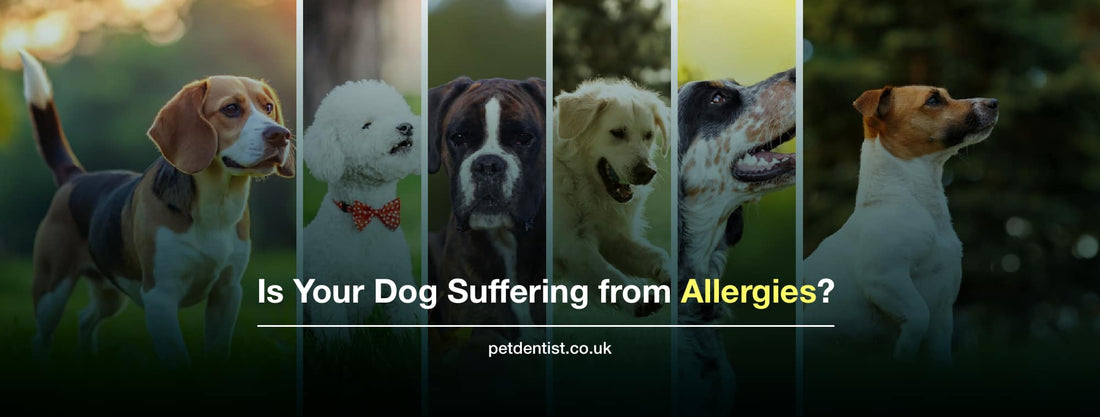
Is Your Dog Suffering from Allergies? Here's What You Need to Know
Share
Just like people, some dogs are more prone to allergies than others. Certain breeds—like Bichon Frises, Terriers, Retrievers, Beagles, Setters, and Boxers—often face allergy issues due to factors like narrow nasal passages, sensitive stomachs, or even allergic reactions to their own hair and dander. But don’t be fooled—any dog can develop allergies, no matter the breed.

Common Signs of Dog Allergies
How do you know if your furry friend is dealing with allergies? Watch out for these telltale signs:
- Red, itchy, or inflamed skin
- Patches of missing fur
- Constant scratching or chewing (especially paws)
- Watery eyes, sneezing, or coughing
- Hives or rashes
- Vomiting or diarrhea
If you notice any of these symptoms, don’t wait—keep a close eye on your dog's behavior. If the symptoms return or persist, it's time to visit the vet. In some cases, a simple change in dog food, adding a flea collar, or using a flea spray can make a big difference.
Mood Swings? Allergies Might Be to Blame
Dogs dealing with allergies can show emotional changes too. They may seem more tired, irritable, needy, or even cranky. Discipline won’t help here—what they need is care and comfort. Start by keeping a journal to track their symptoms, food, environment, and any new exposures. This will help your vet diagnose the problem and suggest effective treatment.
Helping Breeds with Breathing Issues
Small breeds with narrow airways often develop breathing problems as they age. While these issues can’t always be cured, you can make life easier for them by:
- Keeping their sleeping area dust-free
- Vacuuming regularly
- Using a HEPA air filter to reduce airborne irritants
- Keeping them indoors during cold weather and engaging them in indoor play
Battling Fleas: Don’t Let Allergies Take Over
Flea bites can cause severe allergic reactions. If your dog has fleas or has been bitten, act fast:
- Use vet-recommended flea treatments like spot-ons, tablets, or flea collars
- Treat your home with flea sprays or call a professional exterminator if needed
- Once the fleas are gone, use a flea-repellent spray before your dog goes outside
- If your dog has open wounds from scratching, allow them to heal before applying any sprays or shampoos
Food Allergies vs. Skin Allergies
Food allergies usually don’t cause vomiting or diarrhea—skin problems are much more common. If your dog has recurring skin issues, see your vet. They might recommend switching to a hypoallergenic or limited-ingredient diet.
When Your Dog Is Allergic to… Itself?
Yes, some dogs are allergic to their own hair and dander—and unfortunately, this can be one of the toughest allergies to manage. While there's no complete cure, you can help your dog feel better by:
- Brushing daily to remove loose fur and dander
- Bathing once a month with a gentle, vet-approved shampoo
- Keeping your home clean and fur-free
Final Thoughts
Allergies can be frustrating for both you and your pup, but with the right care, management, and support from your vet, your dog can still lead a happy, comfortable life. Keep observing, keep loving, and never hesitate to seek help when your four-legged friend isn’t feeling their best.
